Thinking of buying a new car but not sure if it will fit in your garage or driveway? Or maybe you’re building a house and want to get make sure you end up with a garage size you won’t regret.
From tiny two-seaters to full-size SUVs, cars come in a wide range of lengths. Once you’re done reading, you’ll have a good understanding of about how long a car or truck really is so you can plan accordingly.
How Is Car Length Measured?
The process of measuring overall vehicle length is quite simple. This measurement is taken by accounting for the distance between the forward and rearmost points of a vehicle. In most cases, these points will include the center of both the front and rear bumpers of a vehicle.
With the above in mind, the length of a vehicle is perhaps best measured by using a straight edge to plot the end points of a given vehicle on the pavement below. The distance between these points can then be measured with a tape measure, to provide the overall end-to-end length of the given vehicle.
How Is Car Width Measured?
A vehicle’s width tends to be somewhat more difficult to measure. Doing so involves finding and recording a measurement at the widest point of a vehicle, not including its mirrors. This involves carefully studying a vehicle’s body lines, in order to find a vehicle’s true widest point.
This is perhaps easiest done by marking the positioning of each corner panel, down to the pavement with a straightedge. Then these points can be connected lengthwise with the use of a chalk-line.
With these markings in place, you can easily locate the most significant deviation from this straight line, indicating widened body lines. Once the widest point across a vehicle’s body is marked, the appropriate measurements can be taken.
Average Car Lengths By Vehicle Classification
The average length of a vehicle can vary significantly from one sub-classification to the next, or even within specific subclasses themselves. Nonetheless, there are general in-class average lengths that one can refer to, should the need arise.
Sub-Compact Car
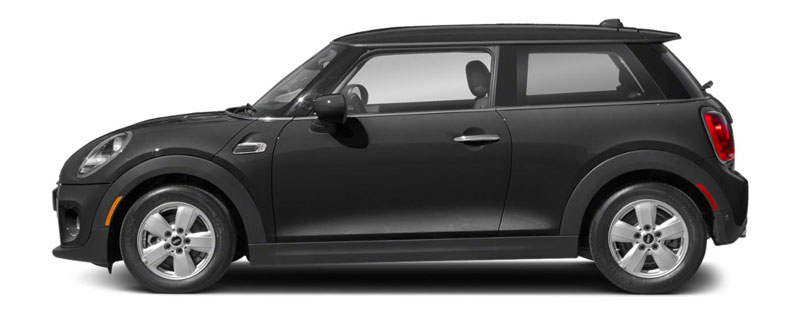
Sub-compact cars are the smallest and the least expensive on the market. They can be maneuvered and parked easily which makes them excellent for busy city life. Sub-compact cars also feature great fuel economy.
Average Sub-Compact Car Length: 13 Feet
Common Sub-Compact Cars:
- 2024 Mini Cooper: 12.7 to 13.3 feet long
- 2023 Kia Rio: 13.3 to 14.4 feet long
- 2024 Mitsubishi Mirage: 12.6 to 14.1 feet long
Compact Car
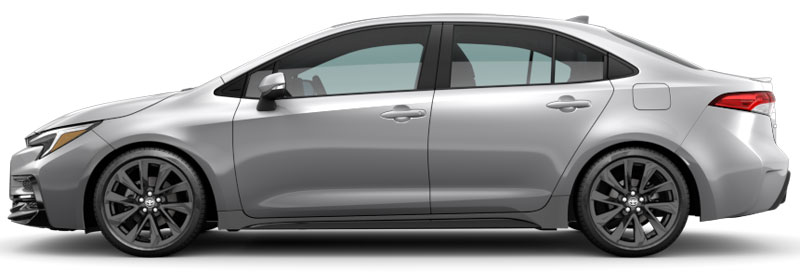
Compact cars are not known for having considerable legroom or trunk capacity but they make great commuter vehicles. Most compact cars have four cylinder engines that provide excellent fuel economy. The compact size of these cars makes pulling in and out of parking spots and traveling in cities.
Average Compact Car Length: 14-15 Feet
Common Compact Cars
- 2024 Honda Civic: 14.9-15.3 feet long
- 2024 Mazda Mazda3: 14.6-15.3 feet long
- 2024 Kia Forte: 15.2 feet long
- 2024 Subaru Impreza: 14.6 feet long
Mid-Size Car

Mid-size cars are some of the most popular vehicles sold on the market today. They are known for their balance between comfort, space, fuel economy, and performance. The combination of all these factors makes them not only ideal for daily commutes but also for taking road trips.
Average Mid-Size Car Length: 16 Feet
Common Mid-Size Cars
- 2024 Toyota Camry: 16-16.2 feet long
- 2024 Nissan Altima: 16.1 feet long
- 2024 Honda Accord: 16.3 feet long
- 2024 Subaru Legacy: 15.9 feet long
Full-Size Car

For a vehicle to be considered a full sized car, it must be the standard that has been set by the EPA. A full sized car must have an interior capacity of more than 120 cubic feet. Full size cars provide a more spacious ride with increased passenger comfort and often are accompanied by additional luxury features.
Average Full-Size Car Length: 16-17 Feet
Common Compact Cars
- 2024 Toyota Crown: 16.3 feet long
- 2024 Nissan Maxima: 16 feet long
- 2024 Chrysler 300: 16.8 feet long
- 2024 Dodge Charger: 16.5 feet long
Compact SUV
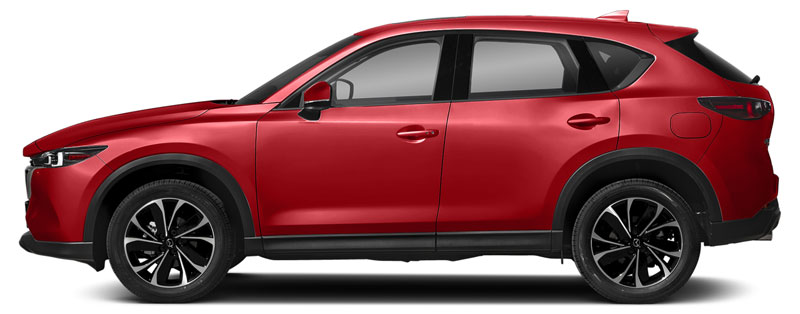
A compact SUV is part of a class of small sports utility vehicles. These vehicles are built on a single piece body making them lighter weight and more fuel efficient. Compact SUVs are known for their sporty and quick handling while seating comfortably four to five adults.
Average Compact SUV Length: 14-15 Feet
Common Compact SUVS
- 2024 Toyota RAV4 15.1 feet long
- 2024 Mazda CX-5: 15 feet long
- 2024 Honda CR-V: 15.4 feet long
- 2024 Hyundai Tucson: 15.1 feet long
Mid-Size SUV
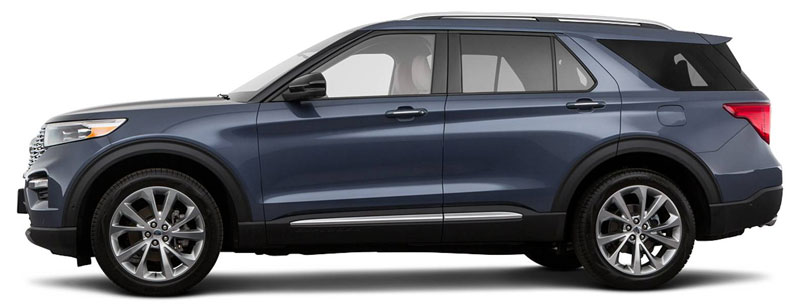
Mid size SUVs fall in between the compact and full size versions. They feature two to three row seating making them suitable for most families. Their higher profile provides them offroad capabilities yet their manuability makes them versatile in any situation.
Average Mid-Size SUV Length: 15.5-17 Feet
Common Mid-Size SUVS
- 2024 Chevrolet Traverse: 17 feet long
- 2024 Nissan Pathfinder: 16.5 feet long
- 2024 Honda Passport: 15.75 feet long
- 2024 Ford Explorer: 16.6 feet long
Full-Size SUV
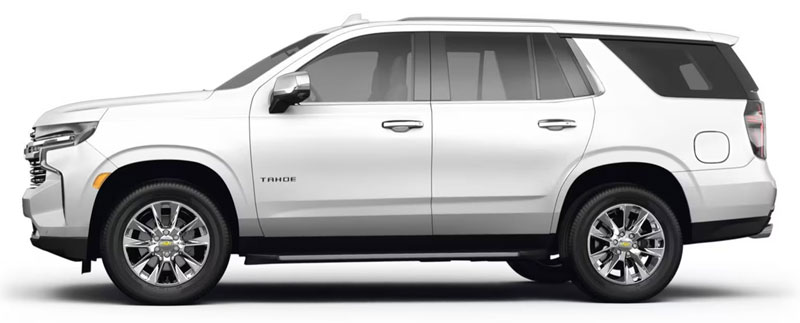
Full size SUVs possess characteristics that are different from their smaller counterparts. Like the mid size SUVs they feature seating for multiple people. Three rows of seating provide transportation for up to 7 people or when folded down, increases the cargo area considerably. Full size SUVs feature the power to tow large items and handle rough terrain.
Average Full-Size SUV Length: 17-19 Feet
Common Full Size SUVS
- 2024 Ford Expedition: 17.5 feet long
- 2024 Chevy Tahoe: 17.5 feet long
- 2024 Jeep Wagoneer:17.9 feet long
- 2024 Toyota Sequoia: 17.3 feet long
Compact Pickup Truck
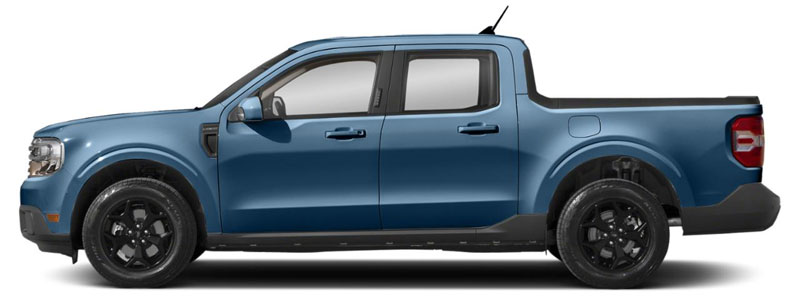
Compact trucks are the smallest size trucks on the market today. They are a blend of a truck and a small SUV. Compact trucks offer the manageability of an SUV with the convenience of a bed capable of hauling and light towing. Currently, there are only 2 compact pickup truck models competing on the market today.
Average Compact Pickup Truck Length: 16-17 Feet
Common Compact Pickup Trucks:
- 2024 Ford Maverick: 16.6 feet long
- 2024 Hyundai Santa Cruz: 16.3 feet long
Mid-Size Pickup Truck
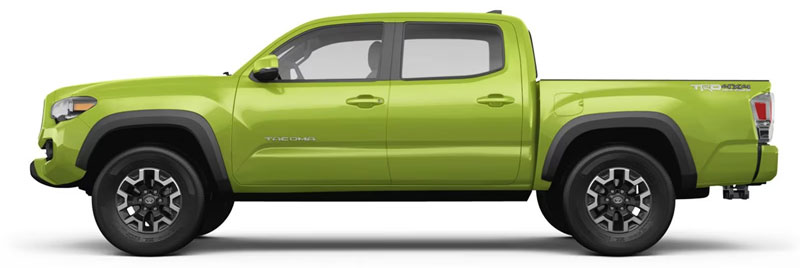
Mid-Size trucks are perfect for the consumer who wants more than the compact size and doesn’t want the bulk of a full size truck. They still have the ability to tow more than 5,000 pounds and haul at least 1,500 pounds in the bed. Several models offer special trims giving them off road capabilities.
Average Mid-Size Pickup Truck Length: 17-18 Feet
Common Mid-Size Pickup Trucks
- 2024 Honda Ridgeline: 17.5 feet long
- 2024 Chevrolet Colorado: 17.7 feet long
- 2024 Nissan Frontier: 17.5 feet long
- 2024 Ford Ranger: 17.5 feet long
Full-Size Pickup Truck
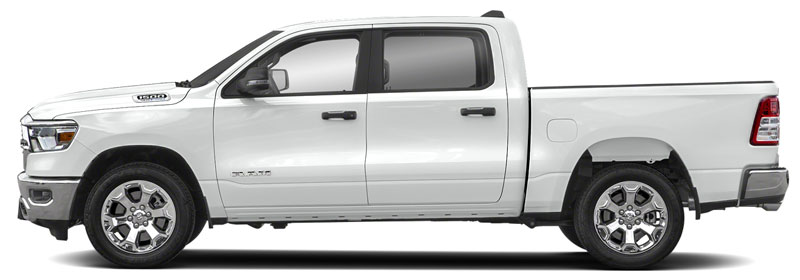
Full-size trucks are available in many trims, body styles, and drivetrains. They are industrious workhorses that are capable of towing and hauling huge loads, all the while passengers enjoy spacious and luxurious interiors.
Full-size trucks offer the availability of single, crew, or extended cabs and bed lengths from six to eight feet in length making actual truck dimensions for models dependent on its configurations.
Average Full-Size Pickup Truck Length: 19-20 Feet
Common Full Size Pickup Trucks
- 2024 Dodge Ram: 19.1+ feet long
- 2024 Ford F-150: 17.4+ feet long
- 2024 Nissan Titan: 19+ feet long
- 2024 Chevrolet Silverado: 17.6+ feet long
Minivan
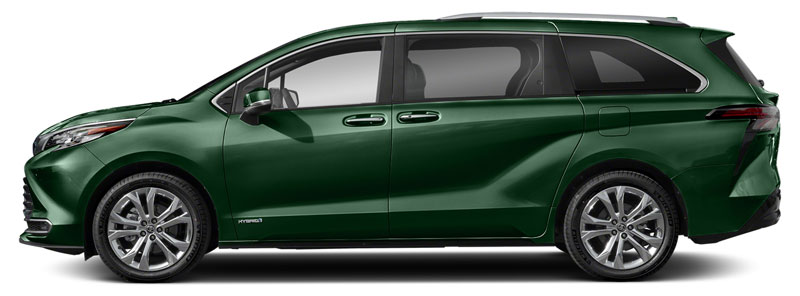
Minivans are built on the chassis of a small car but are distinguished by their sliding or hinged side door. They generally feature 3 rows of seating suitable for eight or nine passengers with added head room for ease of entering and exiting the vehicle.
Since minivans handle like cars, they maneuver easier than SUVs or trucks.
Average Minivan Length: 17 Feet
Common Minivans
- 2024 Toyota Sienna: 17 feet long
- 2024 Honda Odyssey: 17.1 feet long
- 2024 Kia Carnival: 16.9 feet long
- 2024 Chrysler Pacifica: 17 feet long
Station Wagon

A station wagon is a sedan that does not have a trunk. Instead, it has an open area behind the second row seating that is accessed by way of a tailgate. The rear seats may also be folded down to allow more cargo room. Station wagons became popular in the 1950s for family road tripping.
Average Station Wagon Length: 16 Feet
Common Station Wagons
- 2024 Subaru Outback: 16 feet long
- 2024 Audi A6 Allroad: 16.2 feet long
- 2024 Volvo V60: 15.7 feet long
Limousine

A limousine is a luxury sedan or SUV, often driven by a chauffeur, featuring a partition between the driver’s compartment and the passenger area.
A “stretch” limousine is an elongated version of a standard limousine, designed to accommodate more passengers with additional comfort features like entertainment systems, bars, and sometimes even a hot tub. Stretch limos are commonly used for special events, offering a sense of occasion and an elevated experience
Average Stretch Limousine Length: From 20-30 Feet
Determining How Long Your Car Is
There are several different ways that the length of a vehicle is measured, the first of which includes recording a vehicle’s overall length as described above.
This includes marking the forward and rearmost points of a vehicle (often the center of each bumper), before measuring the points in between. This is a measurement of value when determining whether or not a vehicle will fit in a particular garage.
Another method of measuring a vehicle’s length includes recording its applicable wheelbase dimensions. This measurement details the length in between a vehicle’s front and rear wheels.
This measurement is taken from the center point of the vehicle’s front wheel, to the center point of the rear wheel. Though this measurement is widely published by most manufacturers, it tends to be of far less actual value than overall length measurements.
- 6 Epic Car Museums in Germany That Every Car Enthusiast Needs to Visit - Jan 22, 2024
- How Long Is a Car? (Average Lengths By Size Class) - Jan 10, 2024
- 8 Types of Tire Damage (Is It Harmless or a Huge Red Flag?) - Jan 1, 2024

